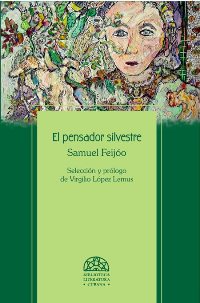4.1.1.22.9 “The Wild Thinker”, 1878 – 1879, by Samuel Feijóo

The collection of poems “El piensor silvestre” (The Wild Thinker) by Samuel Feijóo constitutes a synthesis of his previous poetic thought, in which he manages to express a wisdom that is also sensitive, with a double root in terms of a reflection of a popular gnoseology and at the same time a deep communion with nature that comes from primordial innocence.
The poet expresses in the brief note that serves as an introduction: “I am a natural creator because it is nature that takes me, from me, from what it has placed in me, one of the fleeting products, that observes it, analyzes it, and that, without banal returns, judges it.”
Some critics have pointed out a certain stylistic kinship between Feijóo’s poetry and the lyrical reservoir that constitutes the work of the maestro Martí. Although not intended to be a parallel to the latter, the aforementioned note is entitled “These Very Simple Verses,” perhaps as a reminiscence of José Martí’s volume of “Simple Verses.”
An example of this cosmic wisdom, prior to schools of knowledge and aesthetics, is the poem “It is natural”, in which the manifestation of a natural phenomenon is easily extrapolated to the social, a reading that is suggested from a plain style that does not seek a lyricism of great magnitude but only to contain a message of simple wisdom:
“It’s natural
that the tall and beautiful
palm
excite
to lightning.
In the creeping grass
does not fall.
Humble loving
I am in the shade
of the solitary royal palm,
magnet
of the
RAY.”
In the poem “Faithful,” he shows the weakness of man and, in general, of everything considered great in the infinity of the universe, which appears as an implicit reminiscence. However, it contains an ethical message in the sense that man should not stop his actions, no matter how small the result. The poem has a certain topical affinity with “The Little Prince” by Antoine de Saint-Exupéri:
“Dream, dream,
work and
then, it falls,
faithful.
Don’t forget
that you are a louse
on a planet – louse
in a solar system – louse
in a galaxy – louse
(which will burst once,
and so your bones will contribute
to the colossal bonfire – louse
of the galaxy – entire louse).
So?
Dream and work.
Don’t give up.
The catastrophe doesn’t matter.
“Plant a flower under the lightning.”
Throughout the collection of poems, references to the realm of the diminutive animal abound, in Feijóo’s desire to show with lyrical simplicity the absurdity of hierarchies and to postulate an equality that goes beyond the social, with cosmic roots.
This symbolism of the diminutive and the overlooked flourishes in his poetry in an authentic way. Nor does he hesitate to sing a song of gratitude to “He who cuts the cane,” who, within the framework of social balance, allows the poet to dedicate himself to his verses. Illness and the grotesque also find a home in these pages, in a poetics open to all the flesh and spirit of the world.








